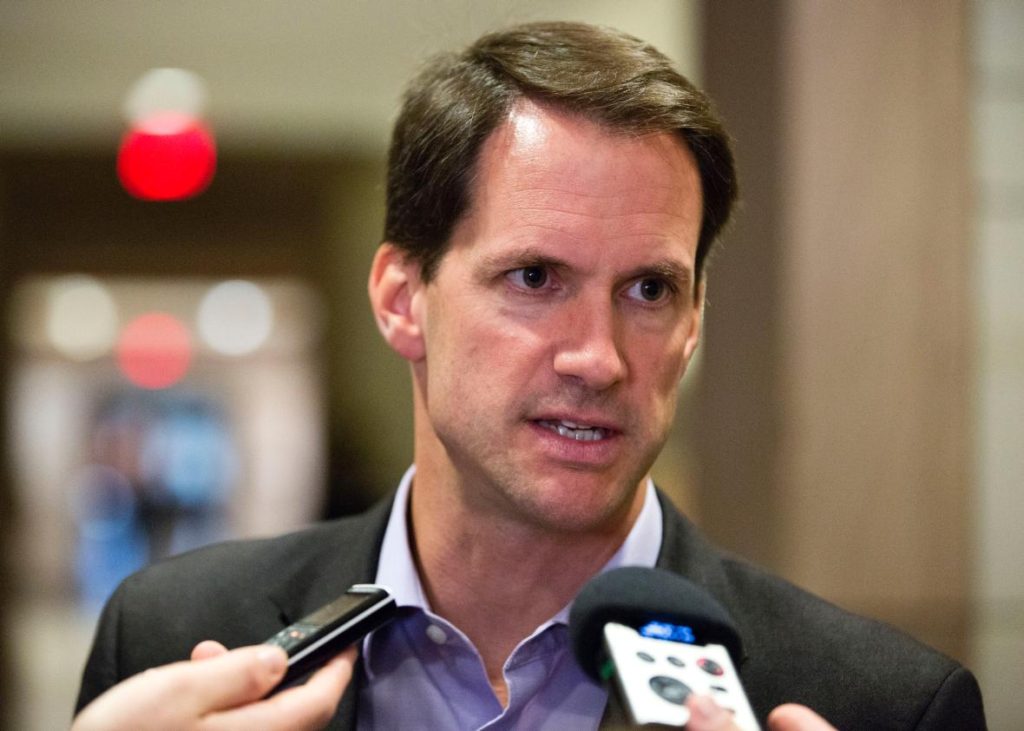By Dahlia Lithwick
SLATE

U.S. Representative Jim Himes (D-CT) speaks to the media after attending a closed meeting for members of Congress on the situation in Syria at the U.S. Capitol in Washington September 1, 2013.
Jim Himes is a Democratic congressman from Connecticut who made headlines last spring when he took a stand in Congress against the traditional moment of silence in the wake of a gun tragedy. This week he took to Twitter to implore the members of the Electoral College, who will cast their votes on Dec. 19, to rethink voting for Donald Trump.
Himes was responding to a Trump tweet lashing out at NBC Nightly News for reporting on his missed intelligence briefings and his recent denunciations of the CIA. Himes’ response was not subtle.
Because Trump won 306 Electoral College votes—more than the 270 votes he needed to win the election—there would need to be a mass defection of Republican electors in the coming days. One would need to sway 37 electors to abandon Trump, and so far, only one GOP elector has publicly announced his plan to defect, although that one elector joined nine Democratic electors to ask for a full security briefing Monday morning (another elector later signed up), given the latest news about Russian meddling. Clearly Himes thinks more electors need to jump in. I reached the congressman via email on Monday to discuss.
Dahlia Lithwick: Democrats are putting an awful lot of stock in these so-called faithless electors or Hamilton electors, but aren’t most electors merely party loyalists who tend to do whatever the party asks of them? Do you really suppose tens of them could flip at the eleventh hour, over what must look to them like meaningless late night Trump tweets, especially when 29 states bar them from doing so?
Rep. Jim Himes: I don’t pretend that this is a plan with a high probability of success. And in fact, I really only rolled around to it after the proverbial straw broke this camel’s back. The wild misstatements of fact, the refusal to learn policy or take intelligence briefings, the focus on the media and the cast of Hamilton, culminating in his delegitimization of the intelligence community and rising to Russia’s defense, convinced me that Trump is unqualified to be President. The very narrow eye of the needle is that some Trump Electors begin to feel the same way, perhaps moved by the forces that moved Sen. Graham and McCain, and that perhaps, as party people, they see the possible damage coming to their party. … As you know, the prescriptive state laws governing their behavior have never been dispositively tested against the intent of the College as it exists in the Constitution.
But isn’t it true that if nobody wins a majority, it would merely throw the final decision to the House of Representatives, which would pick the president? Is that a better outcome for Democrats?
Yes, failure of a majority in the EC throws the election to the House, which, interestingly, would vote not by member but by state. I don’t think that would be worse for Democrats inasmuch as I suspect the House would go for someone like Pence. I don’t agree with a thing that Pence stands for, but he doesn’t scare me the way Trump does. There is of course a cynical school of thought that the best thing for Democrats would be for Trump to become President and then to fail so spectacularly that 2006/2008 would look tame in comparison to 2018/2020. But, this Democrat doesn’t want to run that risk to the Republic.
I was reading your hate tweets. Fun. A lot of your detractors say that the election is done and behind us, that you don’t change processes after the system has been deployed, and it’s too late to start fussing at electors now. Isn’t there truth to the claim that asking electors to defect is kind of like going begging for a constitutional crisis?
So my haters on Twitter are in a logically uncomfortable position. As a matter of law, it ain’t over ‘til the EC votes and Congress ratifies the decision. Both functions are undertaken by people, not by machines or algorithms, and I don’t think it’s unfair to ask those people to use the judgment inherent to their being people. I would argue in return that the EC was set up precisely to check the ascension of a majority-supported demagogue. In this case, the EC could stop a demagogue who DID NOT receive majority support. I’m not sure this would create a constitutional crisis per se. The constitution, and the intent of those who wrote it, is pretty clear. The issue is with the inconsistency of state law with that intent. Sounds like more of a tricky legal question than a constitutional crisis to me.
You also tweeted Sunday night that House Speaker Paul Ryan, Senate Majority Leader Mitch McConnell, and former RNC Chairman and incoming Trump White House chief of staff Reince Priebus were giving Trump cover and “enabling” Trump’s insistence that Russia’s involvement is in doubt. You serve on the House Permanent Select Committee on Intelligence, do you have doubts there was hacking in this election?
There is no doubt that the Russians hacked a whole bunch of entities and people associated with the election (DNC, Podesta, etc). Neither is it in doubt that they caused the information to make its way to Wikileaks. What is murkier is exactly what the Russian intent was.
